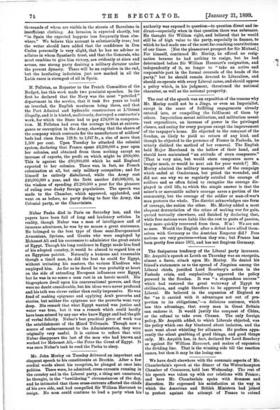The rest of the speech was an exposition of the
reasons why Mr. Morley could not be a Jingo, or even an Imperialist, except in the sense of fulfilling engagements already entered into, or compelling the fulfilment of them by others. Imperialism meant militarism, and militarism meant vast expenditure, an increase of power in the privileged classes, and outlay for every purpose except the improvement of the taxpayer's home. He objected to the conquest of the Soudan, as likely to yield no return of any kind, and though he objected to the presence of France in Fashoda, he utterly disliked the method of her removal. The English held Major Marchand in the hollow of their hand, and should have maintained "an attitude of stern composure." [That is very nice, but would stern composure move a burglar much, or would he next ask for your watch ?] Mr. Morley admired the military management of the campaign which ended at Omdurman, but pitied the wounded, and did not see why we so regularly extolled the courage of soldiers and so often failed to recognise the courage dis- played in civil life, to which the simple answer is that the miner's or mercantile sailor's courage eaves a portion of the community, but the courage of the soldier or man-of-war's man protects the whole. The district acknowledges one form of courage, the nation the other. Mr. Morley added a most eloquent denunciation of the crime of making war for gain, quoted textually elsewhere, and finished by declaring that, while free nations were liable like the rest to gusts of passion, they more quickly recovered from them. H'm ! We are not so sure. Would the English after a defeat have allied them- selves with Germany as the Austrian Emperor did ? Free nations are very gracious—when they win ; but France has been pretty free since 1871, and has not forgiven Germany.


































 Previous page
Previous page